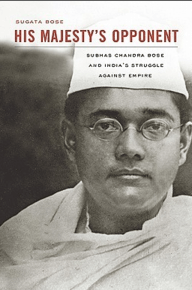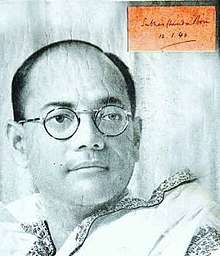His Majesty's Opponent
His Majesty's Opponent or His Majesty's Opponent: Subhas Chandra Bose and India's Struggle Against Empire is an English book written by Sugata Bose.[1] This is a biography of Subhas Chandra Bose. The book was first published in May 2011.[2]
 Front cover | |
| Author | Sugata Bose |
|---|---|
| Language | English |
| Subject | Biography of Subhas Chandra Bose |
| Genre | Biography |
Publication date | May 2011 |
Reception
Hindustan Times wrote in their review that the book was a "template biography", and was "arrestingly written".[3]
References
- "His Majesty's Opponent, By Sugata Bose". The Independent. 22 July 2011. Retrieved 28 March 2019.
- "Bose, Sugata - His Majesty's Opponent: Subhas Chandra Bose and India's Struggle against Empire". projects.iq.harvard.edu. Retrieved 28 March 2019.
- "Review: His Majesty's Opponent". Hindustan Times. 6 August 2011. Retrieved 28 March 2019.
Review
‘His Majesty’s Opponent’[1] is a biography of this great leader of men, compiled meticulously by his grand-nephew, Sugata Bose (grandson of his elder brother, Sarat Chandra Bose). Coming from the filial circle, this ought to be the most authentic version of his biographies. With elaborate research and extensive interviews with his contemporaries and comrades in arms, the author has done a splendid job.
Sugata Bose deftly explores a charismatic personality whose public and private life encapsulated the contradictions of world history in the first half of the twentieth century. He brilliantly evokes Netaji s formation in the intellectual milieu of Calcutta and Cambridge, probes his thoughts and relations during years of exile, and analyzes his ascent to the peak of nationalist politics. Amidst riveting accounts of imprisonment and travels, we glimpse the profundity of his struggle: to unite Hindu and Muslim, men and women, and diverse linguistic groups within a single independent Indian nation. Finally, an authoritative account of his untimely death in a plane crash will put to rest rumors about the fate of this deathless hero.
What the author succeeds in, though, is in presenting a striking portrait of Subhas Chandra Bose - his passion for philosophy (a pleasant surprise to me - Bose's reputation as a "hard-man" of sorts seems to preclude any rumination on the mysteries of life), unshakable devotion to his motherland, resilience in the wake of debilitating illness, and tender love for his wife Emile are presented in vivid yet steady detail. The relative absence of rancor while referring to Gandhi and Nehru - again, taking into account the author's proximity to Bose, and the fact that most accounts of Bose also serve as vicious broadsides against the aforementioned leaders - is particularly refreshing.
The author puts to rest the fanciful matter of Bose being alive for years after his plane crashed without any trouble. He also firmly establishes Bose's secular (the Indian variant which preaches religious tolerance rather than a distancing of religion from the public self) credentials - Hindutvawadis who loudly extol Bose's virtues would not hesitate to label him a "secular minority-appeaser" were he a present-day politician.
This book not only describes the events and happenings in Netaji's life but also explains the attitude, motive and thinking of Netaji behind those instances. This well written book explains who Netaji was, what influenced his thinking, what made him a man of such stature, what was his attitude, plan and solutions for the social, religious and economic problems, which India was facing that time.
Sugata Bose made a sincere effort to provide an unbiased explanation and details of Netaji’s political and personal relations with his fellow comrades and family, his intention behind joining hands with Axis powers, his role as a Hindu-Muslim mediator, as a Congress president, Supreme-commander of INA and the head of provincial govt of free India. He accurately co-related the national and international historical events with Netaji’s life.
All these made this book an authenticated and acclaimed biography of India’s most vibrant, charismatic and beloved leader, whose life’s sole and utter motto was India’s freedom.
It might shred the hearts of so many Indians to find that their leader did indeed die a gruesome death without seeing his dream come true, but as Subhas had always believed, ‘in this mortal world, everything perishes, and will perish, but ideas, ideals and dreams do not’, the story of his life and sacrifice will remain a beacon of hope for millions of young minds that believe in a world of equality and justice!
External links
- Book details at Goodreads
- Sugata, Bose (2011). His Majesty’s Opponent: Subhas Chandra Bose and India’s Struggle against Empire. Penguin. p. 388. ISBN 9780670084210.
